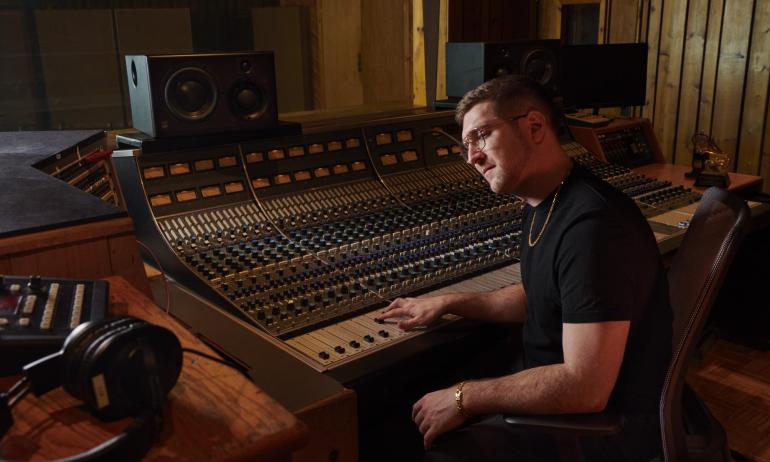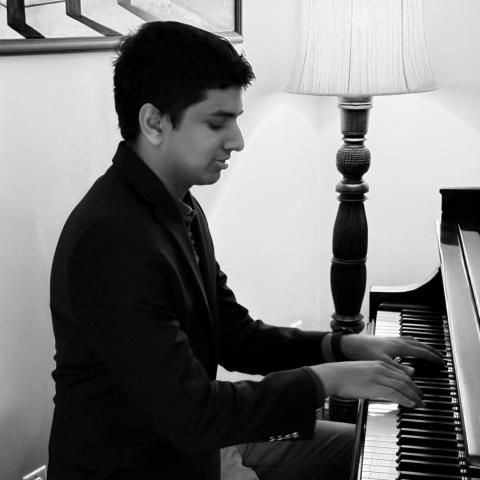Why Music Educators Choose Berklee’s Graduate Programs

Music education students play in and conduct an ensemble.
Image by Kelly Davidson
Anybody who's ever benefited from a great music teacher knows the transformative role that music education can play in a person's life. It's one reason why so many musicians wind up becoming music teachers themselves—to share that love for music that somebody else nurtured in them.
But the decision to pursue a career in the classroom—to get a master's in music education, or to earn a graduate certificate—isn’t always easy. Most working teachers can’t leave the classroom to advance in their careers. And for others, maybe the program they’re interested in is far from where they live.
If you're looking to get your master's degree in music education, or to earn a graduate certificate, Berklee's graduate music education programs offer a flexible, contemporary approach to the music classroom that helps you to connect your teaching to today's culture and technology. With class formats built to accommodate working teachers, online and hybrid learners, and on-campus study, there's never a bad time or place to start your career as a music teacher, or to take the next step in your professional development.
In this article, we'll explore some of the key features of the graduate music education experience at Berklee:
- Three world-class programs
- Online, hybrid, and flexible classes
- Contemporary and culturally responsive teaching
- Customizing your graduate music education experience
- Focused training for teaching students with disabilities
We'll also hear from current students and alumni of Berklee's graduate music education programs, and they'll share their advice on:
- How to earn your music education master's degree or certificate while teaching
- How to earn your music education master's degree remotely
Three World-Class Programs
Berklee offers three graduate programs in music education:
- The Master of Music in Music Education
- The Master of Music in Music Education (Autism Concentration)
- The Graduate Certificate in Music Education and Autism
Each program has been designed to fit the schedules and meet the needs of today's educators. Our Music Education Department is led by Cecil Adderley, the president-elect of the National Association for Music Educators, so students can be assured they're receiving the most forward-looking and rigorous training available. And graduate students in these programs also have the chance to work with some of the world's leading practitioners and scholars of accessible music education through the Berklee Institute for Accessible Arts Education.
Read on to learn more about each program and the adaptive course structure that makes them work for teachers in every stage of their careers.
Online, Hybrid, and Flexible Classes
One of the core values of graduate music education at Berklee is that each program should be able to serve working teachers. That's why the programs are designed to ensure that teachers enrolled in these programs can keep their jobs while they advance their careers through graduate-level training. Courses are offered in the evenings during the fall and spring semesters, and students can enroll in two full-time sessions during the summer.
"This program was flexible for me, a working teacher, which was a must," says Sarah Fard, who took one course at a time and completed her Graduate Certificate in Music Education and Autism in 2018. "I had found myself working as a paraprofessional for students with autism early on in my career, before returning to the music classroom, and noticed that there was a lot that I had not learned in my pre-service education that directly impacted how well I was able to best teach various students. I wanted further training so that I could best support my students and also help other teachers do the same."
"It is very important to enroll in programs that have you working with the materials that you use in the classroom, so that the work you are doing is purposeful."
—
During the academic year, students can also participate in classes remotely using web conferencing and student-directed study formats—a model Berklee's graduate music education programs have been refining for years before COVID-19 made online learning a necessity at other institutions.
"I'm teaching a class tonight where I have five students on the web and four students in the room, and we are all together having class," says Rhoda Bernard, managing director of the Berklee Institute for Accessible Arts Education and the founder of all three graduate programs. "We've been doing hybrid and remote learning in graduate music education since long before it was sexy."
Contemporary and Culturally Responsive Teaching
"People today experience, consume, make, and interact with music in a wide range of ways," explains Bernard, "and we have now access to music from all over the world and from all throughout time in ways that we've never had before, and it has to change how we teach."
While many music education programs still follow outdated models, graduate music education at Berklee is designed to help today's teachers engage with the latest pedagogical, cultural, and technological shifts shaping contemporary learning environments.
"The real future of music is being made at Berklee because the institution is choosing to embrace today’s culture for music, people, and music learning that exists in the world outside of the school," says Adam Calus BM ’17, MM ’21.
"There were no courses on how to take pop music or hip-hop and inject it into your lessons. There were no courses about how to teach 'at-risk youth' or 'disadvantaged populations,' etc.," he says. Instead, "There were classes that at every turn were applying the concepts being taught to today’s music student. There were discussions about the current issues teachers face in the music classroom. There were assignments that had us look deeply into thinking about how what we do can be approached and delivered for all learners to access knowledge from a place of equal footing. It really was, in my opinion, a very honest approach to many of these areas of teaching and learning that typically only get a minimal/surface level investigation."
In addition to considering culturally responsive approaches to music education, students in Berklee's programs are also trained to understand and employ cutting-edge technologies to develop their lessons and aid their students with cloud-based technologies such as MusicFirst and SmartMusic. Berklee's music education faculty are internationally recognized as technological innovators in the field. For instance, Professor Stefani Langol, who teaches graduate courses such as Computer Applications for Music Education and Multimedia for the Educator, was honored in 2021 as Teacher of the Year by the Technology Institute for Music Educators (TI:ME).
Customizing Your Graduate Music Education Experience
While all three programs share some basic traits—a flexible schedule, a contemporary approach, and an audition requirement that ensures all students share a level of musicianship—each is designed to serve educators and administrators in particular ways.
The MM in Music Education provides exceptionally customizable curricular pathways, through electives and through culminating experiences or theses, that enable students to craft unique subspecialties within their master's program. Some students have focused on community music and nonprofit programs, while others have focused on teaching nontraditional students, including indigenous populations.
Calus, for example, used his culminating project to develop an approach to music education he calls Teaching Music Today, which aims "to create the most accessible, equitable, and relevant learning experience for students to take the music they learn from the classroom and into the world," he says. "This means equipping students properly to make music in a variety of contexts, perform on multiple instruments, learn about different genres, identify and deepen their own specific relationship with music, and investigate their community to identify their relationship with the music making people, places, and opportunities that exist outside of school."
Go deeper: In this podcast, learn more about how Rhoda Bernard and the Berklee Institute for Accessible Arts Education (formerly the Institute for Arts Education and Special Needs) bring music education to students with disabilities, and how the institute trains others to do the same.
Focused Training for Teaching Students with Disabilities
Berklee's two autism-focused graduate music education programs are unique in the world. "Typically, when you train to be a music teacher, if you're lucky, you get one class about special education, and it's a class that's legal history and a lot of alphabet soup. . . . It is not about pedagogy," explains Bernard. "These classes are about how to teach students with disabilities. So it is very practical; it is about the actual work of that teaching."
The MM in Music Education (Autism Concentration) is for individuals with an undergraduate degree in music or music education who wish to earn a master's degree with an autism focus. The Graduate Certificate in Music Education and Autism is open to students with a broader undergraduate background who are interested in a focused study of this subject area but do not need or wish to pursue a master's degree.
"The autism concentration in the master's program has truly opened my eyes," says Stephen Raman BM ’16, a current student in Berklee's graduate music education program on track to graduate in 2025. Raman works as an elementary general music and choir teacher in Los Angeles County. "Often, students are dismissed because their neurological state is never considered. But through music education, therapy, and intervention, those students are strengthened cognitively, socially, and joyously."
How to Earn Your Music Education Master's Degree or Certificate While Teaching
We asked Calus and Fard to share advice for working teachers planning to earn their degrees while continuing to teach. Here's what they said . . .
Sarah Fard (Certificate in Music Education and Autism):
- "Be very open about what can and cannot work for you, schedule-wise."
- "Communication is key! There is a supportive team that will help you find ways to make it work."
- "I also think it is very important to enroll in programs that have you working with the materials that you use in the classroom, so that the work you are doing is purposeful."
Adam Calus (MM in Music Education):
- "Pace yourself. While you do need to get your master’s degree to attain your professional license within a specific amount of time, take your time to make the most out of the learning experience you are investing in."
- "Connect with faculty inside and outside of class."
- "Connect with other students."
- "Most importantly—have fun!"
How to Earn Your Music Education Master's Degree Remotely
We asked Raman to share any tips he had on how to succeed while studying in the program remotely. Here's what he said . . .
Stephen Raman (Current Student, MM in Music Education [Autism Concentration]):
- "Consider the time differences and realistically prepare for them. You are in the best music school in the entire world, so a little bit of sacrifice in your life pattern is in order."
- "You might be sleepy sometimes, and will possibly have interruptions. Practice self-care and you will make it through without actually burning out."
- "Your professors are the best and will work with you so long as you communicate."
- "Make friends. You will help each other for life, believe me."
- "Remember: You made it. This is Berklee. It's worth it."




